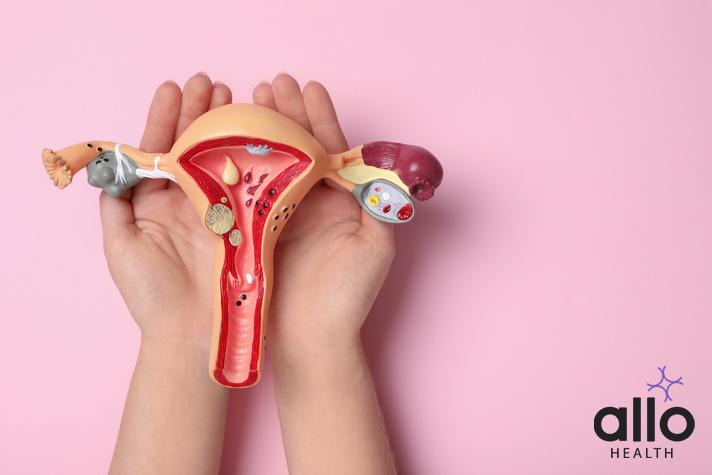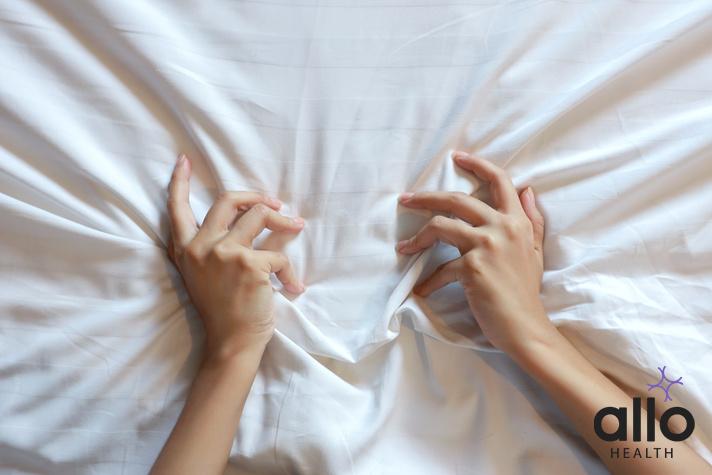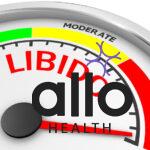How to Increase Sex Drive After Hysterectomy: Tips and Strategies

Allo Health is dedicated to personalized well-being, offering support and trusted information tailored to individual health goals. The platform emphasizes human-generated content, led by a distinguished medical team of experts, including physicians and sexual health specialists. Their commitment to credibility involves rigorous fact-checking, authoritative research, and continuous updates to ensure accurate, up-to-date information. Allo Health's unique approach goes beyond conventional platforms, providing expert-led insights and a continuous commitment to excellence, with user feedback playing a crucial role in shaping the platform's authoritative voice.

Dr. Aditi completed her undergraduate medical education at AJIMS, Mangalore, after which she worked in multi-speciality hospitals with COVID patients and in the Pain and Palliative medicine department. Driven by her experiences, she developed a keen interest in psychiatry. Dr. Aditi believes that mental health is just as, if not more important, than physical health.
Why This Was Upated?
Our experts continually monitor the health and wellness space, and we update our articles when new information became available.
Updated on 08 April, 2024
- Article was updated as part of our commitment to diversity, equity, and inclusion.

"The following blog article provides general information and insights on various topics. However, it is important to note that the information presented is not intended as professional advice in any specific field or area. The content of this blog is for general educational and informational purposes only.
Book consultation
The content should not be interpreted as endorsement, recommendation, or guarantee of any product, service, or information mentioned. Readers are solely responsible for the decisions and actions they take based on the information provided in this blog. It is essential to exercise individual judgment, critical thinking, and personal responsibility when applying or implementing any information or suggestions discussed in the blog."
A hysterectomy is an important, life-altering surgery that can have a significant impact on a woman’s health and well-being. One of the concerns that often arises after this intricate surgery is how to increase sex drive after hysterectomy. Many women experience a reduction in their libido and sexual desire following the procedure, which can be attributed to a variety of factors. In this article, we will explore how to increase sex drive after hysterectomy, as well as effective strategies and treatments to help reignite your desire for sex and improve your overall sex life.
What is Hysterectomy?
- A hysterectomy is a surgical procedure that involves the removal of a woman’s uterus, and in some cases, other reproductive organs like the cervix or ovaries. This intricate surgery can be categorized into different types, such as complete or partial hysterectomy, depending on which organs are removed.
- Hysterectomies can result in a sudden hormone imbalance, leading to symptoms akin to menopause, including hot flashes and night sweats. The loss of female hormones, particularly estrogen, can have significant effects on a woman’s health, causing vaginal dryness, reduced sexual sensation, and even pain during intercourse.
- The surgery itself can lead to physical changes, affecting muscles and vaginal tissues. Recovery time varies, and an abundance of energy is essential during the healing process. Some women experience a drop in libido and mood swings as a result of hormone decline, and this can impact their emotional and mental health.
- In such cases, hormone replacement therapy (HRT) and female libido enhancers can be explored, with medical advice sought to address the hormonal imbalance. Emotional support and communication with a partner also play a crucial role in helping women rediscover their sexual desire and intimacy after undergoing a hysterectomy.
Effects of Hysterectomy on Sexual Health
A hysterectomy, a surgical procedure involving the removal of the uterus, can have profound effects on a woman’s sexual health and overall well-being:
- Hormone Imbalance: Hysterectomy, especially when involving the removal of the ovaries, can lead to a sudden hormone decline. Loss of estrogen, a key female sex hormone, can result in reduced sexual desire (loss of libido), vaginal dryness, and discomfort during sex, impacting one’s sex drive and sexual activity.
- Vaginal Changes: Estrogen loss affects vaginal tissue, causing thinning and reduced elasticity, leading to pain during intercourse (dyspareunia) and a reduction in sexual sensation, which can hinder sexual satisfaction.
- Emotional Impact: The emotional consequences of the surgery, including mood swings and potential anxiety or depression, can further contribute to a loss of interest in sexual activity.
- Physical Discomfort: Post-surgery, patients may experience intense pain during sex and may even face complications that require extended recovery time, affecting their sexual experience.
- Altered Sensation: Removal of the uterus may affect the positioning of pelvic organs, potentially causing changes in sexual sensation.
- Pain During Intercourse: Some women may experience pain during sex post-hysterectomy, either due to vaginal dryness or changes in pelvic anatomy.
- Psychological Factors: The fear of altered sexual function or body image issues may contribute to reduced sexual satisfaction.
Understanding and addressing these effects on sexual health is crucial for women who undergo a hysterectomy to regain a fulfilling sex life and maintain their overall well-being.
What is Sexual Desire?
Sex drive, often referred to as sexual desire or libido, is a person’s innate motivation and inclination towards sexual activity. It encompasses a range of emotional, psychological, and physiological factors that influence a person’s interest in sexual experiences. A healthy sex drive is an essential aspect of one’s overall well-being and can contribute to a satisfying sex life and intimate relationships.
Complications Due to Low Sexual Desire
Complications due to low libido, a reduction in sexual desire, can have a significant impact on an individual’s life:
- Reduced Sex Drive (Libido Drop): Low libido results in a diminished interest in sexual activity, which can strain intimate relationships and lead to frustration.
- Loss of Estrogen: Post-hysterectomy, a decrease in estrogen hormone levels can cause vaginal dryness and pain during intercourse, further diminishing sexual desire.
- Pain During Sex: Hormonal changes and vaginal tissue alterations can lead to discomfort and pain during sexual activity.
- Emotional Impact (Mood Swings): Low libido can trigger mood swings, anxiety, and depression, affecting mental health and overall well-being.
- Relationship Strain: Diminished sexual desire may lead to conflicts and emotional disconnect within relationships.
- Harmful Side Effects (Drug Side Effects): Medications or hormone therapy used to address low libido can have negative side effects.
- Loss of Sexual Sensation: Reduced sexual desire often coincides with a decrease in sexual sensation and enjoyment.
- Intimacy Challenges: Low libido can hinder intimacy and communication between partners, affecting the quality of the relationship.
Addressing low libido after a hysterectomy may require hormone replacement therapy, pelvic floor exercises, or consulting a sex therapist. Recognizing and addressing these complications is essential to improve one’s sex drive and overall quality of life.
Can Hysterectomy Affect Sexual Desire?

Yes, a hysterectomy can significantly affect sexual desire due to various physical and hormonal changes. Here’s how:
- Hormone Decline: Hysterectomy often involves the removal of the ovaries or a reduction in their blood supply, leading to a rapid decline in estrogen production. Estrogen plays a crucial role in maintaining sexual desire and vaginal lubrication.
- Surgical Menopause: Removal of the ovaries can induce a sudden and severe form of menopause known as surgical menopause. The abrupt hormone imbalance can lead to mood swings, hot flashes, and a decrease in sexual desire.
- Vaginal Dryness: Reduced estrogen levels can result in vaginal dryness and discomfort during sexual activity, causing pain or discomfort that may diminish sexual desire.
- Emotional Impact: Coping with the emotional and psychological aspects of the surgery can contribute to stress, anxiety, and depression, all of which can negatively impact sexual desire.
- Physical Discomfort: Post-surgery pain and discomfort can make engaging in sexual activity unappealing, further reducing sexual desire.
- Body Image Concerns: Changes in the body’s appearance or sensation may lead to body image issues, affecting self-esteem and sexual desire.
A hysterectomy can indeed affect sexual desire due to the hormonal, physical, and emotional changes it brings about. However, with proper care, communication, and potential hormone replacement therapy, many women can work towards regaining their sexual desire and enhancing their overall sexual well-being.
How to Increase Sex Drive After Hysterectomy?

Increasing sex drive after a hysterectomy, especially in cases of surgical menopause, involves addressing hormonal changes, physical comfort, and emotional well-being. Here are some strategies and tips:
- Hormone Replacement Therapy (HRT): Consult a healthcare professional to discuss HRT options, which can help restore hormone balance. Estrogen and testosterone levels play a crucial role in sexual desire, and HRT can alleviate symptoms like vaginal dryness, hot flashes, and mood swings.
- Pelvic Floor Exercises: Strengthening your pelvic floor muscles through exercises can improve sensation during sex. This can counteract the reduction in sensation caused by loss of estrogen and promote better sexual function.
- Communication: Open and honest communication with your partner is key. Discuss your concerns and desires, and work together to rebuild intimacy.
- Female Libido Enhancers: Explore female libido enhancers or supplements to boost sexual desire. These can be a helpful addition to your routine with the guidance of a healthcare provider.
- Emotional Support: Seek emotional support from a therapist or counselor. Mood swings and emotional impact are common post-hysterectomy, and addressing these issues can positively affect your sex drive.
- Manual Stimulation: Experiment with manual stimulation to increase sexual sensation. Focus on pleasure and intimacy, which can help you overcome any loss of libido.
- Lifestyle Adjustments: Maintain a healthy lifestyle with proper nutrition and regular exercise. Managing weight gain and overall health can improve your energy levels and self-esteem.
Remember, each woman’s experience is unique, so it’s essential to consult with a healthcare provider to determine the most suitable approach for your specific situation. Hormone balance, emotional well-being, and communication with your partner are key factors in reigniting your desire for sex after a hysterectomy.
Conclusion
A hysterectomy is a major surgical procedure with significant health consequences, but it doesn’t have to mean a permanent reduction in your sex drive. By addressing the hormonal changes, physical discomfort, and emotional challenges that may accompany the surgery, you can take steps to improve your libido and regain a fulfilling sex life. It’s important to consult with a medical professional for guidance tailored to your specific situation and explore various treatment options to meet your needs. Remember that you can overcome the negative effects of hysterectomy and rediscover your desire for sex with patience, care, and the right support.
Most Asked Questions
-
What is a hysterectomy, and how does it affect my sex drive?
A hysterectomy is a surgery that removes a part or all of your uterus. It can reduce your sex drive because it may lead to changes in your hormones and emotions. Understanding these effects is important.
-
Can I do something about the pain and dryness during sex after a hysterectomy?
Yes, you can. Vaginal dryness and pain during sex are common after a hysterectomy. You can talk to your doctor about treatments, like hormone therapy or laser treatment, to help with these issues.
-
Will my sex drive ever come back after a hysterectomy?
Many women find that their sex drive returns after a hysterectomy, but it may take time. Hormone therapy, exercises, and other treatments can help. It’s essential to be patient with yourself and seek professional advice if needed.
-
How can I talk to my partner about these changes in my sex drive?
Open communication is crucial. You can sit down with your partner, share your feelings, and let them know what you’re going through. Together, you can explore new ways to connect intimately and navigate these changes in your sex life.






































